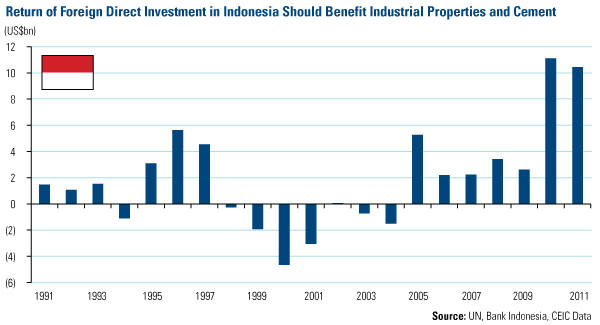Emerging Markets Radar (April 9, 2012)
Strengths
- The Hungarian PMI surged above expectations in March to 56.8, the strongest reading in the last thirteen months, reflecting the positive impact of the opening of the brand new Daimler AG plant. The Czech manufacturing PMI has also improved.
- Brazil’s consumer prices rose 0.21 percent in March from February, the government’s statistics agency said in a report distributed in Rio de Janeiro today. Economists surveyed by Bloomberg had expected inflation of 0.37 percent, according to the median forecast of 50 analysts.
- Chilean consumer prices rose 0.2 percent in March from the previous month, less than analysts’ forecast, bringing annual inflation back within the central bank’s target range for the first time in four months.
- China official March PMI was 53.1 versus the estimate of 50.8, rising 2.1 from February; new orders were up 4.1 points at 55.1 percent. Nevertheless, due to seasonality, March’s PMI is usually 3 points better than February’s, therefore, the market is cautious about the better-than-expected PMI for last month. PMI above 50 indicates industrial activities are expanding.
- China’s March non-manufacturing PMI was 58 versus 48.4 in February, indicating consumer consumption may be resilient.
- Philippines inflation eased to 2.6 percent on a year-over-year basis in March from 2.7 percent in February. A base-year comparison suggests inflation in the country will remain subdued in April. However, inflation trends should turn up from mid-year driven by a resumed rise in oil and commodity prices and strengthening domestic demand.
- March housing transactions increased 40 percent in Beijing, and similar increases were also seen in other tier 1 and tier 2 cities. Some analysts say buyers are encouraged by the fact that the Chinese government had historically failed in curbing housing prices, but others say March sales volume is always the equivalent of combined sales of January and February in the year and March of this year didn’t see better volume than prior years.
- Indonesia’s parliament did not pass the fuel raise bill which was to remove the fuel subsidy and raise fuel prices by 33 percent.
Weaknesses
- The Russian central bank chairman said the liquidity deficit faced by the financial industry is the “new norm” this year. One of the reasons is a continued capital outflow. Russians spent $12 billion on foreign property last year, compared with $5.5 billion a year in 2007 and 2008, according to the chairman.
- Colombian policy makers meeting last month were divided over the need to raise interest rates further to keep inflation in check. Analyst Brian Lesmes, at Grupo Bancolombia in Bogota, said that though inflation and credit demand have eased, further tightening may be needed to cool household demand.
- Thailand inflation edged up to 3.4 percent year-over-year in March from 3.3 percent in February, but base-year comparison suggests inflation in the country will remain subdued in April.
- Indonesia is to discuss an export tax on coal and base metals, which is negative for local materials companies but good for global coal and base metal producers.
- Taiwan may implement a capital gains tax on stock trading profits.
Opportunities
- Citigroup Inc. raised South African equities to overweight, the equivalent of a buy, on expected strong earnings growth and companies’ expansion into Africa’s fast-growing frontier markets, the bank said.
- In the last decade, Indonesia has restored stable economic growth and, therefore, has improved its wealth. With opportunities to build vast infrastructures and industrial complex, foreign direct investments (FDI) now are returning to the country. The increasing FDI has driven up demand for industrial estate and building materials, such as cements.

Threats
- Brazil's tax agency said on Wednesday that intra-company commodities exports and imports by multinational traders must be settled using international prices. The country’s Federal tax authority said the measures are aimed at ending "price manipulation" of inter-company imports and exports that allow multi-national companies to evade local taxes.
- Peru is renegotiating with Mexico to cut natural gas shipments after allocating gas reserves to its domestic industry, a Peruvian government official said. Approximately half of the shipments will be cut, the president of state oil contracting agency Perupetro said this week.
- The Chinese economy is still in the process of a soft landing, but the policy response may fall behind the curve. In 2012, corporate revenue growth is predicted to be much slower than 2011, with gross margins also expected to be lower due to weaker demand and a rise in input costs.











